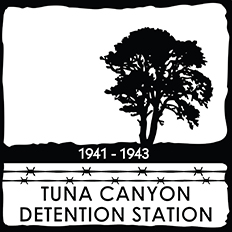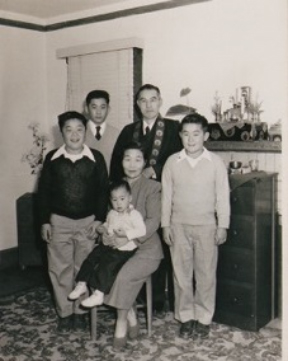
Daishō Tana
Rev. Daishō Tana’s Diary – Santa Fe Lordsburg senji tekikokujin yokuryūjo nikki, vol. 1 – March 14-26, 1942 (Tr. Duncan Ryūken Williams)
Initial Procedures [3/14/1942]
The camp was completely isolated from the outside world, and the only lights that illuminated the darkness were those inside our rooms. When I look up at the clock, it was 7 a.m. Despite that hour, those around me were already chatting rather loudly about the war. Now that we are here, perhaps no one cares what we say.
We were provided with black coffee and oatmeal on a rectangular shaped dish. Not quite satisfying, we all partook of some botamochi (a Japanese sweet made with rice and red bean) that Mr. Hotta brought last night as left overs from lunch that he had had on his way to the camp. This botamochi was cut in half to feed the twelve of us.
I had heard no lunch would be served, so I forced myself to eat the oatmeal. We were told that each individual should wash and return their own dishes. Around 9 a.m., visitors were allowed to meet with the detainees in the camp and they brought us some food. I laughed at myself and would not have forced down the oatmeal had I known about this. At noon, someone brought some Hinomaru (“circle of the sun” Flag of Japan) rice balls [a pickled red plum in white rice], and we gobbled those down. Regardless of whom you know, everyone here already lives like a family. At 2 p.m., family visitations were allowed.
I saw some acquaintances, including Mrs. Shimakawa, so I asked her to give a letter to [my wife] Tomoe. Paradoxically, it made me less anxious not to have any guests.
Around 3 p.m., we were placed into armed truck and driven to the CCC Camp at Tujunga on the outskirts of Los Angeles. It was raining during this transfer, and we finally arrived at the camp at 5:30 p.m.
The camp was surrounded by barbed wire fences almost 20-feet high. We went through luggage inspection, and I was assigned to Barrack F. Dinner tonight was a Japanese meal and included hot miso soup. I felt so relieved while eating it.
There was an inspection/count of the Japanese at 8:30 p.m., and lights were off at 10 p.m. I recited Buddhist texts quietly on my bed in the dark. It was too cold to fall asleep, but I slept well after wrapping my body in a blanket.
Visiting Days [3/15/1942]
I woke up in the CCC temporary internment camp in Tujunga, located on the outskirt of Los Angeles. Rain last night turned into snow on the mountains.
Woke up at 6 a.m. At 6:45 a.m., guard inspection, 7a.m., breakfast and room cleaning, 11:45 a.m., guard inspection. At noon, lunch, 4:15 p.m., guard inspection, 5 p.m., dinner, 8:30 p.m., guard inspection, and 10 p.m., lights out.
Living in this collective and ordered environment made me think of regimented military life. We had to stay 10 feet away from the barbed wire fence. Being cut off from the outside is the most painful thing about being in camp.
Visitors came starting at 1 p.m. Visitors are permitted on Sundays and Wednesdays. Many family members were particularly excited, because today was the first Sunday since we were detained. Detainees without visitors, though, seem at peace. After the brief 30-minute visit, detainees near the fence and their families in a bicycle parking lot waved to each other, all in tears. How could one communicate through a grate during the 30-minute visit? A fellow internee who could speak English was required to be present to translate if one could only speak Japanese. Prisoners and families could only touch their fingers through the grate. I can only imagine how these families felt, seeing their husbands or fathers in prison. Many detainees did not sleep that night after lights out. Letting them see their families in this unsatisfactory way is not necessarily kindness. Detainees are not criminals. The way the visitation is organized ignores human dignity and it should be reorganized to reflect American values such as liberty.
Please contact remembertunacanyon@gmail.com to make a request for the rest of the translated diary.



